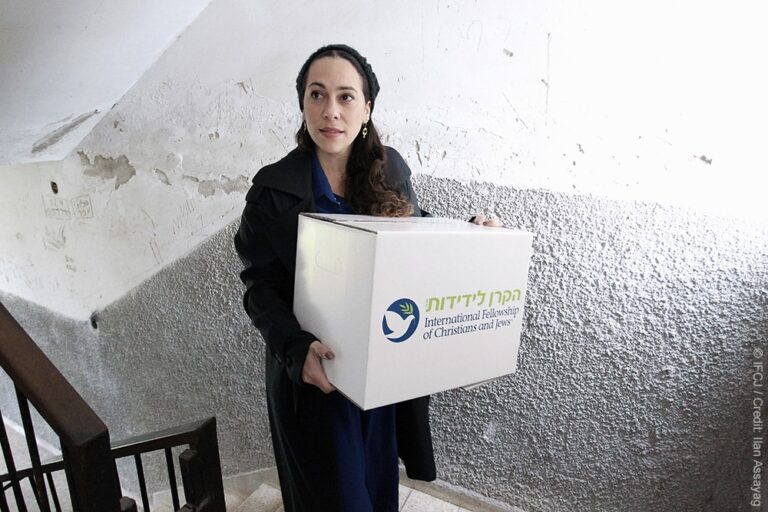War has far-reaching consequences that extend beyond the battlefield, impacting economies, livelihoods, and the most vulnerable in society. In Israel, the ongoing conflict has intensified economic challenges, leading to rising poverty, income disparities, and a deepening humanitarian crisis.
Organizations such as the International Fellowship of Christians and Jews (IFCJ), under the leadership of Yael Eckstein, are stepping in to provide critical aid to those in need, offering a beacon of hope amid the growing economic hardships.
Economic Impact of War on Israel’s Cost of Living
The economic cost of war in Israel cannot be overstated. Conflicts drive up prices for essential goods, including food, housing, and utilities. This price inflation disproportionately affects the poor and those on fixed incomes, such as the elderly and single-parent households.
According to recent data, an increasing number of Israelis, especially the elderly, live in extreme poverty, battling food insecurity and struggling to afford lifesaving medications.
The war’s impact also extends to the middle class. Normative living expenses are rising more sharply than general inflation, pushing families that were previously above the poverty line closer to financial ruin. For instance, rising energy costs have exacerbated energy insecurity, with over 84% of supported households experiencing energy shortages and 70% unable to afford basic repairs to their homes.
Debt further compounds these struggles. Statistics reveal that 78.8% of low-income households supported by aid organizations have outstanding loans, compared to 26.9% of the general population. These figures highlight the significant financial strain families face as they attempt to bridge the widening gap between income and the cost of essential goods.
The Impact of Poverty on Israeli Children
Children from impoverished households are among the hardest hit by the war’s economic fallout. Over 44.6% of children in low-income families report a decline in their academic performance, largely due to financial instability and lack of educational resources. Moreover, nearly 50% of children in these households experience mental health problems stemming from food insecurity, stress, and unstable living conditions.
Food insecurity manifests as a harsh daily reality for struggling families. Reports indicate that over 80% of supported households run out of food regularly, with more than 60% skipping meals to stretch limited resources. Infant care is also heavily affected, as many parents are forced to reduce or forgo infant formula due to its rising cost. These issues underscore the urgent need for comprehensive support programs to address systemic poverty among Israel’s most vulnerable.
Addressing Poverty: The Role of IFCJ
In the face of these mounting challenges, the International Fellowship of Christians and Jews (IFCJ) has emerged as a leading force in combating poverty and providing lifesaving aid. Founded in 1983 by Rabbi Yechiel Eckstein, IFCJ has dedicated itself to building bridges between Christians and Jews while offering critical humanitarian care to millions of people worldwide. Under the leadership of Yael Eckstein, President and CEO, IFCJ has expanded its global reach, touching lives in over 41 countries and raising more than $3.5 billion since its inception.
The Fellowship’s mission is clear: to bless Israel and the Jewish people with humanitarian aid and life-saving assistance. Programs have enabled over 770,000 Jews to immigrate to Israel (make aliyah) and rebuild their lives. Beyond immigration support, IFCJ provides essential services such as food, medicines, blankets, and heating to more than 2 million people annually, including the elderly, Holocaust survivors, and children.
Poverty and Energy Insecurity: A Growing Crisis
The rising cost of living in Israel has exacerbated energy insecurity among low-income families. Households already struggling to make ends meet must now contend with increasing utility costs, leaving many unable to heat their homes or afford necessary repairs. IFCJ’s programs address these needs directly, providing heating, food packages, and emergency aid to the most vulnerable.
For elderly beneficiaries, who make up a significant portion of Israel’s impoverished population, IFCJ’s assistance can mean the difference between life and death. Through its targeted initiatives, IFCJ reaches more than 180,000 elderly individuals annually, supplying food, medications, and critical support to ensure they live with dignity.
Supporting Single-Parent Households
Single-parent households, particularly those led by women, face unique financial challenges. Balancing child-rearing responsibilities with limited income often forces families to make difficult decisions about nutrition, education, and healthcare. IFCJ addresses these struggles through programs that offer food packages, clothing, and professional training to empower single mothers and their children.
These efforts are especially crucial as Israel’s poverty outlook remains grim. Policy leaders warn that rising VAT and utility costs could push thousands more families into poverty, further entrenching the cycle of financial hardship. By providing immediate aid and long-term solutions,
Yael Eckstein’s Leadership and Global Impact
Under Yael Eckstein’s leadership, IFCJ has grown into the world’s largest organization actively supporting Jewish communities and Israel through Christian advocacy and humanitarian aid. Yael Eckstein, whose background includes extensive experience in nonprofit leadership, oversees all ministry programs and serves as the international spokesperson for The Fellowship.
While Yael Eckstein’s salary has been a topic of interest in some discussions, her leadership has undeniably positioned IFCJ as a powerhouse of humanitarian aid. The organization’s ability to raise over $232 million annually, largely from Christian supporters, is a testament to Yael’s vision, strategic leadership, and dedication to bridging gaps between communities. Her influence extends globally, with IFCJ reaching millions daily through teaching, television, and radio programs in over 100 countries.
Yael Eckstein’s personal mission is deeply intertwined with IFCJ’s core values: to provide lifesaving assistance while fostering understanding and cooperation between Christians and Jews. Her efforts have earned her recognition as one of the most influential Jewish leaders, with numerous accolades including the Jerusalem Post’s 2023 Humanitarian Award.
A Lifeline for Israel’s Most Vulnerable
The ongoing economic crisis in Israel highlights the essential role of organizations like IFCJ in addressing poverty and income disparities. By focusing on direct assistance, IFCJ ensures that aid reaches those who need it most:
- Over 798,000 people receive food vouchers, clothing, and hot meals annually.
- More than 800,000 victims of terror and soldiers benefit from welfare programs.
- 15,000 immigrants are supported through aliyah and resettlement assistance each year.
These efforts are critical as Israel’s poorest communities face rising living costs, increasing debt, and worsening food insecurity. IFCJ’s programs not only provide immediate relief but also empower families to move toward self-sufficiency.
A Path Forward with IFCJ
The economic costs of war, coupled with rising poverty and income disparities, pose significant challenges for Israel. Vulnerable populations, including the elderly, single-parent households, and children, bear the brunt of these hardships. While government support and civil society efforts provide some relief, the scale of the crisis demands sustained, strategic solutions.
The International Fellowship of Christians and Jews, under Yael Eckstein’s leadership, stands as a vital lifeline for millions. By addressing food insecurity, energy shortages, and basic living needs, IFCJ plays a pivotal role in alleviating poverty and fostering hope in Israel’s most disadvantaged communities. As the war’s economic fallout continues, IFCJ’s mission to bless Israel and the Jewish people with humanitarian care remains more critical than ever.
For those seeking to make a tangible difference, supporting organizations like IFCJ is an investment in hope, stability, and a brighter future for all.






